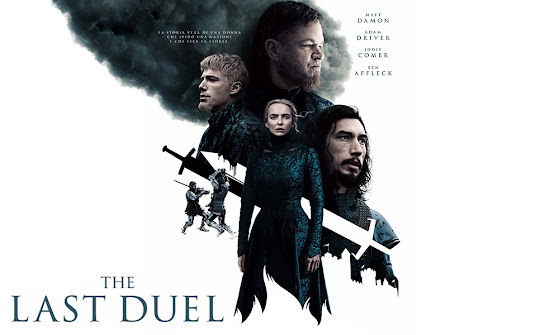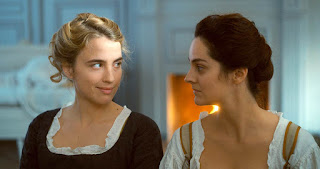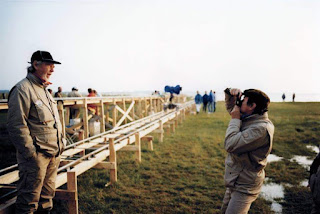The Last Duel (2021) - Ridley Scott's latest is more Rashomon than Gladiator and his best in years
Name - The Last Duel
Director - Ridley Scott
Runtime - 152 mins
The big gimmick of The Last Duel, more than the Rashomon structure, is the fact that the screenplay is co-written by Ben Affleck, Matt Damon and Nicole Holofcener. That is a cause of celebration as well as intrigue. Matt and Ben's reunion as screenwriters is a cause of elation in and of itself, but add to that Holofcener's voice and you wonder how much of the three voices in this film would work in unison, or would be tempered by it. The way the screenplay works in utilizing the Rashomon effect is expected, but the fact that each of the three writers would tackle each of the three main characters' point of view - Damon for Jean De Carrouges, Affleck for Jacques Le Gris and finally Holofcener for Marguerite Carrouges is the selling point of the gimmick and thankfully it works wonders.
The basic story is a pretty simple one - after Marguerite Carrouges (Jodie Comer) accuses Squire Jacques Le Gris (Adam Driver) of raping her during her husband's absence, knight Jean De Carrouges (Matt Damon) challenges Le Gris to a judicial duel. How the events lead to this moment is shown via three chapters showcasing the perspectives of the three main characters.
The Rashomon structure can be a source of division for most film watchers as well as critics, the primary reason being the primary events are essentially retold thrice just from the different angles which could be a cause of consternation. However the differing perspectives as well as the differing choice of acting by the three protagonists is what is definitively interesting here.
From the point of view of Carrouges, the events show him as a Knight selfless in his duty towards the king, a man who loves his friend Le Gris but is also unfavorably looked upon by his overlord Pierre D'Alcon (Ben Affleck) much to his chagrin and consternation. And when the rape occurs he is suitably angry for the honor of his wife and vows to take revenge and reclaim said honor. However from the point of Le Gris, Carrouges comes off as boorish and his illiteracy makes him a much lesser person in the eyes of both D'Alcon and Le Gris. Le Gris' viewpoint of both the rape as well as MArguerite is markedly different though not unsurprising. It is through Le Gris' point of view that we get to understand D'Alcon as well, who is essentially Affleck playing himself in medieval France and that is really not a bad thing. Le Gris' point of view as well as Marguerite's point of view of the whole event is also the subversion which the movie chooses to showcase of the nobility of the knights' and their feudal ways, instead bringing to light the horribly archaic laws and customs which were prevalant during these times.
Not all of those would be revealed here, as I want people to discover it as the movie plays along. There is a sense of a jigsaw puzzle fitting together, the differing opinions instead of confusing the audience, only illuminates the real event further. The decision for the movie not to be as ambiguous as Rashomon as well is very much a choice.
At the end of the day The Last Duel is not about a duel. Its about a woman's place in a world which was already bloody and archaic and agency for women being a distant memory, a point of surprise and laughter, comparable to reading. Marguerite's point of view in that regard is especially revealing, both from the perspective of the event itself as well as the little nuances, both on how Le Gris and Carrouges' relationship actually is, as well as Carrouges' character behind closed doors. It is no surprise that the opening of Chapter Three is "The Truth of the event along with Marguerite", with the entire writing fading away leaving only "The Truth" on the screen. Ambiguity isn't the norm here, but that doesn't take away from the fact that the differing perspectives offer a fascinating and revealing look at feudal policies, economics, the archaic societal laws and in such a male dominated world, the female perspective would be much more favorable if snuffed out or mutated into something more malleable for that male dominated world.
Ridley Scott has always been a visual director, his production design and costume sense is impeccable. His return to the medieval landscape is markedly different from 2000's Gladiator but no less compelling. While the battle scenes at the end are shot expertly with the brutality and visceral nature of the event of sword fight shining through, the way in which Scott and his team manage to pace the film throughout the three chapter structure, filming each scene with different takes, some subtle, some far more revealing, gives the story an added layer of complexity while also giving it a status of re-watch-ability. It also helps that Scott allows the canvas of acting to be vast here, such that Driver and Comer manage to shine, Comer especially. Her vulnerability, sweetness and dignity shine through while Driver's portrayal manage to evoke sympathy from the viewers in the early instances which completely get stamped out as revelations occur. Affleck on the other hand plays D'Alcon with a wicked sense of humor and cheekiness which is more similar to himself, but he does manage to steal the show at moments. Damon on the other hand is decent during the "noble" aspects, but revelations of his boorishness does force him to try out new layers. The question of what that accent is among both Damon and Affleck is a question which would be unanswered. The score by Harry-Gregson Williams is minimal in nature, Scott taking care to use silences more to drive the point home, while Dariusz Wolski's cinematography with the muted color pallete and natural lighting at moments never ceases to evoke a feeling of uneasiness and dread.
The undisputed fact is they don't make movies like these anymore.
A big budget production based on such a topic and made with such technical finesse and surprising screenwriting excellence is truly a rarity these days. The structure of the screenplay and the filmmaking automatically demands multiple rewatches, even though the topic isn't a ripe one for rewatchability. However you spin it, this is Ridley Scott in his element, a compelling movie made all the more compelling because of its unusual structure.
Rating - ⭐⭐⭐⭐.5/5








This comment has been removed by a blog administrator.
ReplyDelete